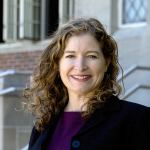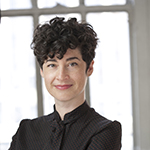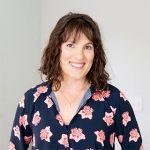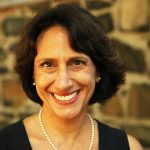 Professor Rebecca Puhl was featured in an article in ConscienHealth on Weight Stigma. Read the article here.
Professor Rebecca Puhl was featured in an article in ConscienHealth on Weight Stigma. Read the article here.
Faculty
Rebecca Puhl featured Charlotte Sun article
 Rebecca Puhl was featured in an article in the Charlotte Sun on weight stigma around the world. Read the article here.
Rebecca Puhl was featured in an article in the Charlotte Sun on weight stigma around the world. Read the article here.
Leah Lessard and Rebecca Puhl’s research featured in UConn Today

Leah Lessard and Rebecca Puhl’s research, on how adolescents report increased weight stigma on social media during the pandemic, was featured in UConn Today. Read the article here.
Eva Lefkowitz, HDFS Faculty Spotlight, August 2021
Professor and Department Head, Human Development and Family Sciences
 Eva Lefkowitz moved to UConn in Summer, 2016 to become Department Head of HDFS. She recently agreed to a second five-year term as Department Head. Over the past five years, Eva has enjoyed getting to know the faculty, staff, and students in HDFS, CLAS, and around UConn.
Eva Lefkowitz moved to UConn in Summer, 2016 to become Department Head of HDFS. She recently agreed to a second five-year term as Department Head. Over the past five years, Eva has enjoyed getting to know the faculty, staff, and students in HDFS, CLAS, and around UConn.
Prior to coming to UConn, she served as a professor of Human Development and Family Studies at the Pennsylvania State University for 18 years, including roles as Professor-in-Charge of the HDFS Graduate Program and Professor-in-Charge of the Undergraduate Program. She earned her Ph.D. from University of California, Los Angeles in Developmental Psychology.
Eva’s research focuses on sexual health, using a developmental perspective to examine predictors of negative and positive aspects of sexual health, and the broader health and relationship implications of sexual health. Her research demonstrates that a range of individual and contextual factors, from the couple level of who the partner is up to the institutional level of identification with a religious institution, are associated with sexual health. In addition, her research highlights the importance of sexual behaviors beyond their implications for physical health, demonstrating that by young adulthood, sexual behavior can positively contribute to well-being. Eva views mentoring as the most important and rewarding aspect of her career, and her students strongly influence the direction of her research. In Spring 2020, she and her students received pilot funding to collect data on LGBTQ+ college students around the country as they adjusted to the COVID-19 pandemic. This project has sparked further interest in how LGBTQ+ students’ experiences with family, peers, romantic partners, and close others affect their well-being.
Eva has served as a principal investigator, co-investigator, or faculty mentor on projects funded by the NICHD, NIAAA, NIDA, NIA, and the WT Grant Foundation. She has published 90 peer reviewed articles and book chapters. At the national level, Eva has been in leadership roles for the Society for Research on Adolescence (SRA) and the Society for the Study of Emerging Adulthood (SSEA). She has contributed to the review process as Associate Editor for Developmental Psychology, on the editorial boards of Journal of Research on Adolescence and Emerging Adulthood, as a reviewer for 25 other journals, and as a Review Panel Chair and Reviewer for SRA and SRCD. She also has reviewed grant proposals for NIH National Institutes of Health, and for similar federal agencies outside the United States. In 2008 Eva received the Evelyn R. Saubel Faculty Award from the Penn State College of Health and Human Development.
At UConn, Eva’s favorite classes to teach have been the 350 student lifespan individual and family development class (for many students, their first college class ever), and a small graduate seminar on professional and career development.
When not working, Eva spends time with her husband Eric, also a UConn professor, and her teenage twins, who are frequently delighted by her extensive knowledge of adolescent development (not exactly). Eva spent the first 18 years of her life in Fairfield County, Connecticut and after living in Massachusetts, California, and Pennsylvania was excited to return to Connecticut. She loves cooking and baking, barre class and walking, beach vacations, and listening to audiobooks.
Rebecca Puhl featured in news articles- CNN, NPR News, & WTOP
 Professor Rebecca Puhl is featured in news articles about talking to kids about weight, and how the pandemic changed how we eat and shop.
Professor Rebecca Puhl is featured in news articles about talking to kids about weight, and how the pandemic changed how we eat and shop.
Read the article in CNN: The Pandemic Changed the Way we Ate and Shopped – Not Always for the Better
Read the article in MPR News: How to talk to kids about weight
Read the article in WTOP: La pandemia cambio nuestra forma de comer y hacer las compras
Laura Mauldin quoted in The Intercept
 Associate Professor Laura Mauldin was quoted in a story published in The Intercept, about the reproductive rights of disabled people- “There’s a Legal Term for What Britney Spears Says Is Happening: Sexual Violence”. Read the story here.
Associate Professor Laura Mauldin was quoted in a story published in The Intercept, about the reproductive rights of disabled people- “There’s a Legal Term for What Britney Spears Says Is Happening: Sexual Violence”. Read the story here.
Rebecca Puhl quoted in the news for work on doctors’ role in weight stigma
 Professor Rebecca Puhl is quoted in the news for her work on doctors’ role in weight stigma
Professor Rebecca Puhl is quoted in the news for her work on doctors’ role in weight stigma
-
- MedPage Today: Most Patients with Obesity Face Stigma From Doctors Too
- She Knows: Yes, Fat-Shaming is a Legitimate Public Health Issue
- Prevention: Is Your Doctor Judging You? Inside the Dangerous World of Patient Shaming
- GDA: El estigma es el prinicpal enemigo de la salud para las personas con obesidad
- MedScape: Be Their Cheerleader:’ Docs Should Try to Reduce Weight Stigma
Rebecca Puhl featured in various outlets for international work
 Professor Rebecca Puhl is featured in various outlets for her recent international work on weight stigma:
Professor Rebecca Puhl is featured in various outlets for her recent international work on weight stigma:
-
- Metro UK: Fat Phobia is “Universal” Because Obese People Face Stigma Around the World
- UConn Today: International Study of Weight Stigma Reveals Similar, Pervasive Experiences Across Six Countries
- Daily Mail: More than HALF of Overweight People Say They Face Prejudice
- Medical Xpress: International Study of Weight Stigma Reveals Similar, Pervasive Experiences
- London Evening Standard: Majority of adults say they have suffered stigma about weight, research shows
- TechRegister: Fatphobia is ‘universal’ as obese people face bigotry across the world
- InfoBae: Salud. – Un estudio internacional sobre el estigma del peso revela experiencias generalizadas, tambien en la atencion sanitaria
- Daily Star: Fatphobia is ‘universal’ as people face discrimination around the world, study says
- London Daily Mirror: Fat Prejudice Heavy Burden Around the Globe
- Baller Alert: Survey shows people around the world experience fat-shaming from family, friends, doctors, and others
- Bariatric News: More than half of adults experience weight stigma
- Eat This: This Weight Stigma Has Become a Global Health Problem
- ARCHYDE: People around the world are stigmatized for their weight, even in healthcare
- Le Droit: La grossophobie, un phénomène mondial aux conséquences néfastes pour tous
Beth Russell, HDFS Faculty Spotlight, July 2021
Associate Professor and Associate Department Head of Undergraduate Studies
 Beth Russell has spent the last 15 years studying how people regulate psychological distress. Her studies examine how individuals and families respond to stress across a range of typical life events (like the transition to parenthood) and atypical experiences (such as raising children in the context of chronic health conditions). Her most recent work focuses on substance use trajectories from adolescence through adulthood and considers how individual substance use intersects with close family relationships (relationship antecedents to substance use, or caregiver burden consequences during active use and recovery). She is currently funded on several teams to develop and test cognitive behavioral interventions that target the regulation of distress as the mediators of substance use and recovery outcomes.
Beth Russell has spent the last 15 years studying how people regulate psychological distress. Her studies examine how individuals and families respond to stress across a range of typical life events (like the transition to parenthood) and atypical experiences (such as raising children in the context of chronic health conditions). Her most recent work focuses on substance use trajectories from adolescence through adulthood and considers how individual substance use intersects with close family relationships (relationship antecedents to substance use, or caregiver burden consequences during active use and recovery). She is currently funded on several teams to develop and test cognitive behavioral interventions that target the regulation of distress as the mediators of substance use and recovery outcomes.
Families are a primary source of socialization that guide individuals during times of stress. Much of the modeling parents and close loved ones provide about how to manage challenges is shaped by these caregivers’ own attitudes about stress and the coping behaviors they have found effective. These effortful actions to modulate a stressful experience are a compliment to the procedural emotion regulation behaviors that may be modeled in a home without explicit intent to “teach” about coping – – alcohol use, for example. Family member supports to cope with stress extend far beyond childhood and are especially needed when facing difficult circumstances. Dr. Russell’s recent work during the COVID pandemic demonstrated that caregivers and younger adults reported exacerbated psychological distress during the pandemic, providing longitudinal evidence from two national survey studies of the differential impacts these groups experienced over a 12-month period. Describing the unique distress and resilience trajectories among subgroups at heightened risk for mental health struggles is an important step in tailoring accessible and equitable interventions for those with the greatest needs.
Beth became the Director of the Center for Applied Research in Human Development (CARHD) in 2018, where she has over a decade of experience directing evaluations of human service programs that provide supports to disadvantaged communities, helping programs identify what works best for whom within their client populations. Her work as Director strives to ensure CARHD is a sustainable interdisciplinary contributor to UConn’s Land Grant Mission, given its mission to enable the development and application of interventions intended to improve quality of life for individuals, families, and communities. Dr. Russell is also an Associate Editor for the Journal of Child & Family Studies, and sits on editorial board for the Journal of Primary Prevention.
Outside of work, Beth spends time with her family, in her gardens, and connecting with friends over good food. Her whole family loves traveling to find the best beaches, jungles, waterfalls, and caves, and is looking forward to tackling a few new adventures together in the post-Covid world.
Marlene Schwartz featured in Medical Xpress
 Professor Marlene Schwartz featured in Medical Xpress in an article, Color-coded nutrition info helps food pantry clients choose healthier options. Read the article here.
Professor Marlene Schwartz featured in Medical Xpress in an article, Color-coded nutrition info helps food pantry clients choose healthier options. Read the article here.